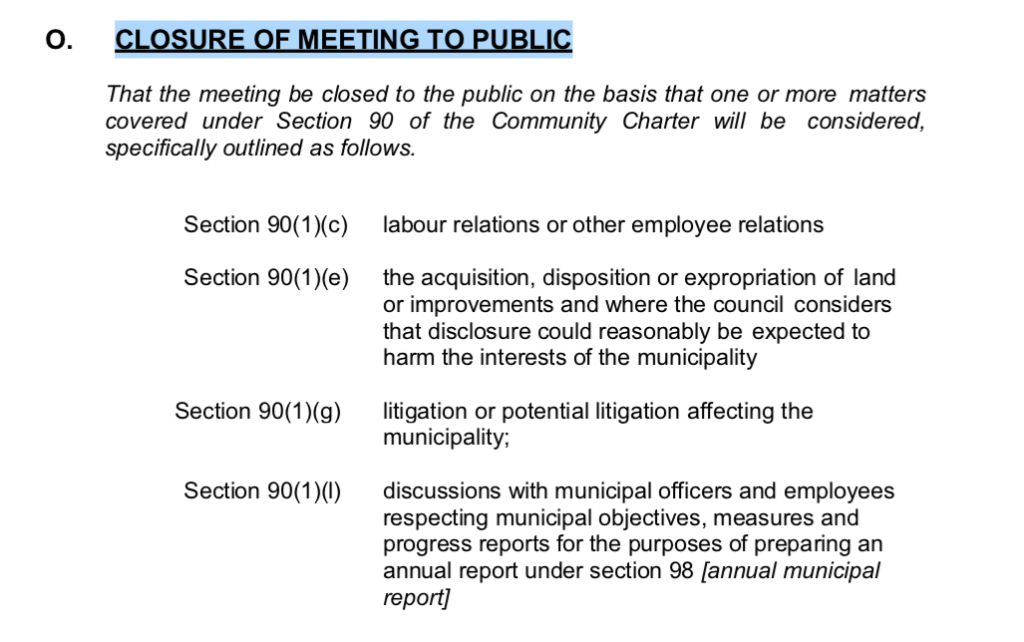I would argue Yes, it is good, and here is why.
Background
First a little background. With today’s January 28, 2019 meeting, the City Council for Port Alberni appears to have quietly changed the way it is handling “in-camera” meetings of Council. In the past, all in-camera meetings were held as completely separate “Special Meetings” of Council.
Resident Keith Ambrose asks a question about it as well… I think this shows the value. You can see that and Council’s response here.
Under the Community Charter a Special meeting is defined as:
Council meetings
125
….
(4) A special council meeting is a council meeting other than a regular meeting or an adjourned meeting.
…..
Calling of special council meetings
126 (1) The mayor may call a special council meeting in his or her discretion.
Community Charter of BC January 28, 2018
(2) Two or more council members may, in writing, request that the mayor call a special council meeting.
(3) Two or more council members may themselves call a special council meeting if,
(a)within 24 hours after receiving a request under subsection (2), no arrangements are made under subsection (1) for a special council meeting to be held within the next 7 days, or
(b)both the mayor and the person designated under section 130 [designation of member to act in place of mayor] are absent or otherwise unable to act.
(4) If a special council meeting is called under subsection (3), the council members calling the meeting or the corporate officer must sign the notice under section 127 [notice of council meetings] in place of the mayor.
As you can see a special meeting can actually be called for any reason by the Mayor or by two or more Council members. In-Camera meetings are not required or expected to be separate ar all.
The conventional practice in Port Alberni and perhaps more widely especially before the turn of the century had been to have Special Meetings on the same Monday as Regular council meetings. These were controlled by the Mayor.
The more common practice now, and what you see at the Alberni Clayoquot Regional District, is for a section to be added to the Regular meeting agenda for going in-camera.
City Council Regular Meeting now includes closing.
This change is a good thing. In order for the meeting to be conducted practically, the in-camera portion is generally done at the very beginning of the meeting or at the very end. Here are some benefits of having an in-camera portion to the regular meeting vs a separate in-camera meeting.
- The Council is not seen to be holding “secret” meetings separate from the regular meeting.
- The reasons (cited under Section 90 or 91 of the Community Charter) for closing a meeting are listed right there on the regular meeting agenda. Previously these were on a separate agenda.
- Because Special Meetings were not held in Council Chambers, those agendas with the reasons for closing the meeting were not distributed in person to members of the public. They were only available online.
- In-Camera business is a required part of any overseeing Board’s work so this change emphasizes that point while ensuring transparency.
One final note, closing the meeting while in progress means that the Council can be more responsive. Whatever happens during a closed portion of a meeting can be immediately revealed, in whole or at least in part, by “reporting-out” once the closed period is done. At the Regional District there is an “In-Camera” section, followed by “Recommendations to the Board from in-Camera”.
All that said, this change isn’t perfect. On the current City Agenda, Section K “Report from In-Camera” comes before the new Section O “Closure of Meeting to the Public”. Perhaps there should be a second section related to the closed part of the regular meeting held after the closed session so that in-camera business that has occured between regular meetings can still be dealt with before during the meat of the regular open meeting. By having it at the end of the meeting will reporting out in public be practical? Perhaps the closed portion should be at the beginning of the meeting.
Also worth mentioning: The long list (including “labour, land and legal”) of fifteen reasons meetings can be closed under Section 90 subsection 1 are reasons they “may” be closed. They are not required to be. Only matters covered under the five reasons in Section 90 subsection 2 “must” be closed. These deal with inter-government negotiations, matters from the Ombudsperson or under FOIPPA, or a couple other rare cases. I only remember a couple of times when the reasons for a closed meeting fell under one of the “must” conditions.
Overall I see this as a positive change. This can also be seen in some respects as a removal of power from the Mayor’s hands and back into Council as a whole but what it especially does is ensure there are far fewer “secret meetings” and when a “Special Meeting” is called, it’s actually Special, not just an old convention.



You must be logged in to post a comment.